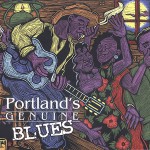Sandin Wilson
 Into My World
Into My World
Self-Produced
Over the past twenty years or so, bassist Sandin Wilson has played with some of the best musicians and bands in Portland, including Quarterflash and Nu Shooz; as well as serving as a hired session gun to countless artists in the recording studio. His resume lists appearances on over one hundred local and national recordings. Even when Sandin was still a teenager, fresh out of Hollywood’s GIT/Bass Institute of Technology, he was already known in musical circles for his performance at Carnegie Hall, at age sixteen, with “America’s Youth in Concert”.
For this outing, Wilson presents eleven, mostly instrumental numbers (five have vocal arrangements of some sort, three have sung lyrics) of the smooth jazz/pop, persuasion; seven or eight of which he had a hand in writing. Co-producer Jimmy Haslip (Yellowjackets), penned two of the tunes, and one, “Is It You,” is a cover of a 1981 song co-written by guitarist Lee Ritenour. All the tracks feature Wilson’s versatile bass work in high relief, frequently affording him the opportunity to engage in stalwart “lead bass” maneuvers, or dynamic duets with one of his fellow players.
For this project, Wilson surrounds himself with some of the best musicians around, including guitarists Doug Fraser (Quarterflash) and Jay “Jaybird” Koder (Cool‘r) ; pianist Tom Grant, keyboardist Jim Fischer, drummers Carlton Jackson and Reinhardt Melz, and saxman Tim Bryson, among many other guest performers. The results are impeccably precise in execution, expertly detailed, flawlessly rendered, perfect for the adult contemporary radio formats of the KINKs of the world.
The first piece, “Meldtrip” starts off moodily, with Wilson squibbing through heavily chorused bass, like the late Jaco Pastorius. Soon enough, the track erupts into an up tempo funk number, Wilson’s prickly bass driving the tune, while Bryson’s sax duets with various synth horn sections, ala Grover Washington. Paul Mazzio’s foggy flugelhorn is the centerpiece for “Candlelight,” expertly duetting with Wilson on six-string bass through the course of the number. Lush.
“Break The Bluelines” features Wilson singing the lyrics- which are somewhat elusive in their context (could this be a sentimental ballad about ice hockey?). Wilson’s voice is soulful enough, the song perhaps somewhat reminiscent of what Toto turned out in later years. Wilson’s rumbling basses (there seem to be a couple of them in the mix) drive “Olympus,” holding down the bottom, while at the same time churning like a funky rhythm guitar. Bryson again duets with Wilson on six-string bass, as Tom Grant adds tasty piano fills at the turns. A little Spyro Gyra-like.
Moving more toward the soothing strains of New Age, “Sedona” is an easy going number, that finds Wilson soloing with a sound comparable to that of a standard guitar. Mazzio supplies a muted trumpet for backup. Tasty. “Into My World,” another sung piece, funky, reminiscent somewhat of Stevie Wonder or Jamiroquai, is a ballsy fusillade driven by Wilson’s monster bass, Fraser’s characteristic smoldering guitar and Bryson’s slithering horn sections.
Koder’s funky noodling guitar and Bob Sheppard’s soaring soprano sax are the chief features of “Italian Cuisine.” Wilson, for the most part remains in the background on this track, his garrulous bass, ticking like a time bomb in the background.
“I Can’t Make You Love Me” is a restrained ballad (maybe or maybe not a version of the song Bonnie Raitt made famous, it‘s hard to tell), with Wilson starting things off with a stately 6-String bass solo, then duetting with Bryson on sax in the choruses. Mazzio again grabs the spotlight with a spiffy flugelhorn solo. But it is Wilson’s stunning ability on the bass that truly comes to the fore, as Sandin establishes himself as one of the true contemporary masters of his instrument, with this track.
The group’s version of Haslip’s “Emit Al” is probably the jazziest cut of the bunch, with Bryson’s sax and Mazzio muted trumpet setting the table for more theatrics by Wilson: his bass boiling and bubbling like a space shuttle upon re-entry. Wilson’s vocal take on Lee Ritenour’s “Is It You” is more angular than Eric Tagg’s vocal on the original version- though not necessarily less pleasing. Instrumentally, the band does a good job of updating its predecessor, though it really wasn’t much of a song in the first place. “A Walk In Central Park” offers Wilson the opportunity to stretch out all on his own. A short fugue-like number.
Many years in the making, this album is an obvious labor of love, designed to bring to Wilson the critical attention that has always been his due. Though perhaps, as the consummate sideman, his place has always seemed to be in the background, with this album Wilson is afforded the opportunity to stand front and center. As “lead bass player” Wilson demonstrates the sort of abilities and techniques upon which most bassists can only marvel and dream.
Juliet Wyers
 Clear
Clear
Self-Produced
We first heard from singer/songwriter Juliet Wyers about six or seven years ago, when she broke onto the scene with songs that called to mind Shawn Colvin for some and Joni Mitchell for others. Then Juliet promptly disappeared from the local music scene for several years, choosing instead to care for her terminally ill mother. After her mother’s death, which hit Juliet very hard, she found solace in returning to music and songwriting. Her songs reflect the emotional catharsis she has endured.
The result is this wonderfully warm and intelligent collection of thirteen original songs, whose lyrics diverge from the mainstream- dealing with subjects such as a “metal detector man,” and which incorporate quotes from unlikely sources (for pop music anyway) such as from Albert Einstein and comparative mythologist Joseph Campbell. She even provides information regarding the various acoustic guitar tunings she employs for each song on the album.
The album kicks off with “Life-Love Me,” a graceful petition to the forces of nature to embrace her soul: a wish for transformation and fulfillment; over a rich baritone C5/9 tuning- sounding a bit like Sinead Lohan and Nanci Griffith in the process. The song comes from an interesting lyrical perspective that skims along the surface of triteness without quite tumbling in. It is Juliet’s conviction and spirit that really sell the song.
Her lyrical perspective is somewhat reminiscent of that of Emily Dickinson (without, perhaps Dickinson’s sense of solipsistic desolation: “Mirth is the mail of anguish,/In which it caution arm”)- as in “Into The Blue Light,” where Juliet begins the song by saying “There’s a time of day /when the light changes/just after the sun drops down/the west side of anything might go golden/Everything else is a blue cloud.”
Later in the song, she quotes Einstein; as well as referring to phase transitions in various states of matter (i.e. gas, liquid, solid, plasma, etc.) whereby when heat is applied to, say, a solid, such as dry ice (frozen carbon dioxide), the solid converts directly to a gas (skipping the melting and evaporation phases) by means of a process called sublimation. The point being: that the physics of chemistry have rarely (if ever) been lyrical subject matter in pop music. In this regard, Juliet Wyers got there first. Shawn Colvin comes to mind as the musical muse on this number.
Former Calobo keyboardist Jenny Conlee’s forlorn accordion sty lings and Sandin Wilson’s elegantly understated bassline embroider the title track, a sort of Sarah McLachlan meets Shawn Colvin sort of ballad. Pretty.
“Gogo Boots” is a distinct change of pace- a gently sensual bossa nova, motivated by the shifting sands of Craig Hamblin’s tropical upright bass. The song is somewhat reminiscent of Joni Mitchell’s later work, especially, the wild lyric about an eccentric woman. “The gogo boots introduced an odd canter to her walk/When she needed to move fast/her thighs took over, knees dropping low/And she felt like Tina Turner’s daughter/Local men would call out/ Sometimes they caught her.”
Even more of a departure is the Suzanne Vega-like “Bully On A Bad Day.” John McVey’s angular electric guitar lines intersect with Chris Leighton’s muscularly subdued drum work. Juliet turns to the piano for solo accompaniment on “Broken Heart,” a piquantly beautiful song, with subtly exotic melodic turns on the evocative Bmajor-Gmajor-G#minor chord progression that weaves itself through the arrangement. “I fell in love with your broken heart/Your softened eyes/Your held apart/I see you now in your tender skin/Your strong outside/Your fragile in.” Lovely.
Guest Eddie Perente’s mournful viola and Erin Moreland’s (Doris Daze) peripatetic banjo decorate the bittersweet tale of “Metal Detector Man.” Juliet’s exquisite overdubbed vocal harmonies, lend a wistful Roche sisters blend to the mix. Another pretty, prayerful tune, and the beginning of a trilogy of songs that deal with loss and redemption, carefully wrought by Juliet on piano, “Light Moving Across You” creates a pensive and solitary mood.
“Vigil” continues the meditative mood, with Juliet contemplating her mother’s death, honestly and forthrightly. A sad, but spiritually uplifting song. Help Me Understand” is a fine acapella spiritual whose traditional vocal arrangement includes the voice of Margaret Linn (Linn, Mien Street) in a harmony role. A wonderful new hymn, wonderfully performed.
Expertly shifting gears yet again, Juliet’s spirits rise once more with “First Hot Day,” where Moreland’s banjo interplays sublimely with Leighton’s drum- a cheerfully exhilarating number, full of energy and life. The final track “See You Next Year,” resembles the first track, “Life…” somewhat, utilizing the same, robust C5/9 tuning; lending the entire project a cyclic sense of completion and renewal.
Juliet Wyers has purged her troubled psyche with this delightful recording. Showing great maturity, wisdom and artistic vision, she has crafted a fitting tribute to the subject of life and death. The depth and breadth of emotions she has experienced in the past few years are clearly played out through the course of these thirteen songs: a personal statement of great magnitude and majesty.
Various Artists
 Portland’s Genuine Blues
Portland’s Genuine Blues
Allegro Blues Records
The blues are an ubiquitous musical form. One can find bands performing the blues in every city in the nation. Several cities lay claim to be being blues hubs: Chicago, Memphis, New Orleans, etc. However none of these cities have anything on Portland, Oregon. For whatever reason (the crazy weather perhaps?), Portland is one of the contemporary centers for the blues. Unbeknownst to most locals, Portland features some of the nation’s finest blues acts and performers. Many of them appear on this album.
Someone, somewhere, determined the year 2003 to be the “Year Of The Blues.” This works out well as a theme for this year’s edition of the 15th annual Portland Waterfront Blues Festival (running from July 3rd through the 6th), the second largest blues festival in the nation. In celebration of this year’s event, Allegro Corporation (one of the major independent distributors of recorded product in the nation), in conjunction with Miller Genuine Draft, Safeway (the festival sponsor) and the Oregon Food Bank, has collected this compilation (featuring some of Portland’s best-loved blues acts, as well as some talented newcomers), the official CD of this year’s Waterfront Blues Festival. A portion of the proceeds from sales of this CD will be donated to the Oregon Food Bank.
The fourteen tracks presented here include cuts contributed by local stalwarts, such as the Paul DeLay Band, Terry Robb, Linda Hornbuckle (and No DeLay) and Ellen Whyte and Reflex Blue. The album also serves as the coming out party for David Jacobs-Strain, an exciting new artist, as well as the Cannonballs. In addition, Sheila Wilcoxson has contributed “Grinnin’ In Your Face,“ the opening track from her early ‘90s debut album “Sheila,” and a song which features a then-unknown Kelly Joe Phelps backing her.
The album leads off with bassman Albert Reda’s take on the Blind Blake tune “Dyin’ Blues.” The track starts off with an effect that makes the track sound like some authentic audio artifact recovered from the ‘20s, before evolving into a more contemporary sound. Terry Robb contributes some tasty acoustic guitar licks in the turns. Following up are Ellen Whyte and Reflex Blues with the original number, “Take It Back,” a sultry number that showcases Whyte’s smoldering vocals and tight ensemble work form the band.
Nineteen year old David Jacobs-Strain displays deftness and skill beyond his years on the acoustic guitar with his track, “River Was Green.” His husky voice, rich with nuance and tortured intonation gives rise to speculation that Strain may be one of the great new stars on the Northwest blues horizon.
Stu Kinzel and Lynn Ann Hyde, known as Kinzel and Hyde, cook in their version of the traditional “Can’t Lose What You Never Had.” Kinzel, who has been a well known guitarslinger around town for well over two decades has been playing with Hyde, one of the few women harp players on the scene (and one of the very few women ever to actually win an endorsement from Hohner Harmonicas), for over five years. Together they create a real ruckus, duetting flawlessly and soloing expertly though this blues chestnut.
Local mainstay Norman Sylvester is one of the founding fathers of the local blues scene, playing in Portland when the blues was not a musical trend for every individual over the age of 35 to embrace as a comfortable, familiar and safe art form. Here, Sylvester is backed by a strong cast including Rob Shoemaker on bass, Janice Scroggins on keys and Bill Rhodes (of the Party Kings) on the harp, on a jovial original number called “Too Happy To Sing The Blues.” The song takes the standard 12-bar blues format and turns it on its ear, lyrically. Norman’s soulful guitar solo in the middle is a thing of beauty.
Rhodes and the Party Kings return for a track of their own, with a molten take of Floyd Jones’ slow, sexy Chicago-style blues: “You Can’t Live Long.” Rhodes puts the reeds of his harp through a severe test on his extended solo, crying and chortling like a bawling baby. Alan Hager’s lazy slide guitar solo slithers like a slippery snake. Floating effortlessly over the rhythm section.
Newcomers to the Portland scene, the Cannonballs, offer a certifiable star in singer guitarist Lloyd Allen. His buttery smooth voice reminds of Al Green and Joe Tex, with a soul-tinged quality that instantly caramelizes in the brain. On the original song “Mother Don’t Think I’m An Angel,” keyboardist David Vest (who played with Paul Delay, once upon a time) adds colorful piano accompaniment, while layering synth-strings into the background. Very hot!
Vocalist Sheila Wilcoxson has been a staple in the Portland music scene for well over twenty years. Here, singing “Grinnin’ I Your Face,” a Son House tune, accompanied on acoustic guitar by Kelly Jo Phelps, Sheila percolates with customary gusto, her voice creaking and breaking like the floorboards of a shotgun shack. About as authentic as it gets!
Speaking of authentic, the Paul DeLay Band’s live cut “Paul Train” (taken from his album, Burnin’), is a smokin’ little number upon which Paul pulls out the stops on his chromatic harp. From Little Walter to Paul Butterfield to Larry Adler to Toots Thielemans, one can hear it all in the way Paul blows. All the other members of the band get to stretch out with solos on this short jam, but it’s DeLay who grabs the spotlight with two great solos.
Born in Compton, California (home to seminal gangsta rappers NWA) Bobby Sims now resides in Bend, Oregon, but it’s a cinch he’s learned something about the blues along the way. His rendition of Peter Green’s “Long Grey Mare” captures the tortured frustration of the original while approximating something of Green‘s flair on guitar. Terry Robb, one of the patriarchs of the Portland blues scene, slides through a steadfast version of Furry Lewis’ “Judge Boushay Blues.” Curling catlike moans from his bottleneck on acoustic guitar strings, Robb wrings every nuance from his guitar, as only he can.
Portland veteran Robbie Laws jumps on board with his original song “Swamp Thang,” a sort of Tony Joe White (“Polk Salad Annie”) meets Creedence Clearwater Revival (“Suzie Q”) shuffle. Laws’ gruff and gritty baritone vocal demonstrating plenty of roadwear, making of it the perfect vehicle for singing the blues. Fun stuff. Drummer, Drawback Slim’s silky smooth baritone seems nearer to those of crooners Joe Williams, Lou Rawls and Brook Benton (with a touch of B.B. King’s pathos and a dollop of Joe Turner‘s sly Memphis cool) on his original tune “Answering Machine Blues.” Having played with over two-hundred acts, through the course of his thirty year career, including with Lloyd Jones and Mel Solomon, among countless local bands, over the past fifteen years- Slim has paid his certainly paid his dues; proving he has the right to sing the blues. The true tale behind this song is a good example.
Finally, local treasure Linda Hornbuckle’s beautiful, gospel-laden rendition of “Amazing Grace” is a fitting finale to a very sharp set. With an amazing variety of styles and voices, this sampler plays like a well-produced radio show and pleases like a fine box of candy. All of the tracks featured here can be found on albums produced by the individual artists. This wonderful album is a fine entree into the blues community thriving in Portland. For the uninitiated this album will come as quite a pleasant surprise. For longtime fans, this set will serve as proof of the very high level of blues talent practicing in our city.
